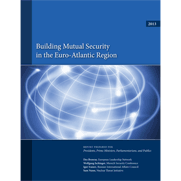
Des Browne
Vice Chair, NTI
Warning that the region’s security policies are dangerously out-of-date, potentially destabilizing and costly, more than 30 top military, political and security experts from the Europe, Russia and the United States have provided specific recommendations to presidents, prime ministers, parliamentarians and publics for moving out from under the persistent Cold War shadow of mutual assured destruction to mutual security.
“The blunt truth is that security policies in the Euro-Atlantic region remain largely on Cold War autopilot: large strategic nuclear forces are ready to be launched in minutes; thousands of tactical nuclear weapons remain in Europe; a decades-old missile defence debate remains stuck in neutral; and new security challenges associated with prompt-strike forces, cybersecurity, and space remain contentious and inadequately addressed,” the report says. “This legacy contributes to tensions and mistrust across the Euro-Atlantic region and needlessly drives up the risks and costs of national defence at a time of unprecedented austerity and tight national budgets.”
“While there is much more at stake here than ‘guns versus butter’, in the area of nuclear weapons alone, the potential price tag is breathtaking,” the report states. “We must ask ourselves why, two decades after the Cold War has ended, must the United States, Russia, France, Germany, Italy, the United Kingdom, and other European nations spend hundreds of billions of dollars, roubles, euros, and pounds in response to these tensions, while both local and national leaders face a growing list of fiscal demands and unmet needs?”
The report — Building Mutual Security in the Euro-Atlantic Region — was written by former U.K. Secretary of Defence Des Browne, Munich Security Conference chairman and former German Deputy Foreign Minister Wolfgang Ischinger, former Russian Foreign Affairs Minister Igor Ivanov and former U.S. Senator Sam Nunn. Over the past year, the authors have worked with a distinguished group of senior political, military and security experts from across the Euro-Atlantic region, an area that includes six of the world’s 10 largest economies, four of the five declared nuclear weapons states and more than 95 percent of global nuclear inventories.
Participants in the project include generals who commanded the most deadly nuclear arsenals ever deployed and many other senior military and civilian leaders who have served on both sides of the Cold War in France, Germany, Russia, the United Kingdom, the United States and NATO.
The report’s authors conclude that today’s leaders should move decisively and permanently toward a new security strategy through a politically mandated dialogue and an integrated approach to the full range of security issues. In each of the six key areas addressed – nuclear forces, missile defences, prompt-strike forces, conventional forces, cybersecurity and space – they offer specific steps to reduce dangers and a new approach grounded in today’s opportunities and challenges. Specific illustrative steps with phasing are laid out in Section IV of the full report.
Some steps could be implemented in years one through five; others in years six through 15. Issues relating to nuclear weapons and missile defense should receive the highest priority in the first five years; however, it should also be possible to take steps relating to conventional forces, cybersecurity, and space during the initial phase.
The authors believe that reducing the role of nuclear weapons as an essential part of any nation’s overall security posture — without jeopardizing the security of any of the parties — should be among the core principles guiding the new dialogue. This should include practical steps to increase decision time and crisis stability for leaders, in particular with respect to U.S. and Russian strategic nuclear forces. Even under the latest U.S.-Russian nuclear arms treaty, each country will maintain thousands of nuclear warheads on hundreds of ballistic missiles ready for prompt launch and capable of hitting their targets in less than 30 minutes.
The full report, the related Co-Chairs’ Summary and a Russian-language version of the report were published by the European Leadership Network, the Munich Security Conference, the Russian International Affairs Council and the Nuclear Threat Initiative and can be found at www.BuildingMutual Security.org
###
Sign up for our newsletter to get the latest on nuclear and biological threats.
In this analysis, experts examine what happened in Warsaw and the implications for the future of security in the Euro-Atlantic region.
In a new piece for the European Leadership Network, Deepti Choubey lays out key steps states should take to tap the full potential of the 2014 Nuclear Security Summit.
On Sep. 12, the German Marshall Fund of the United States will be hosting a discussion on the findings from "Building Mutual Security in the Euro-Atlantic Region."


